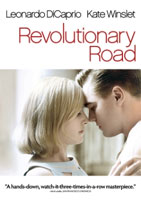Revolutionary Road, the 2008 downer that reunites Kate Winslet and Leonardo DiCaprio, is out on DVD. If you decide to rent it, make sure you brace yourself for two hours of Kate and Leo shouting “give me a damn Oscar!” at each other and the Academy members this movie is made for. Ok, I get it. The 1950’s were not a time of peace and prosperity in America. They were not a time when the Greatest Generation put the war behind them, bought a house, and gave their family the life they dreamed of as they fought their way through Europe and the Pacific. Instead, it was a soul crushing decade of suburban conformity. If you lived in the suburbs, worked at a job, and occasionally smiled at visitors, you’d pretty much given up. You were an empty, hopeless drone. At least, that’s what the movies tell us.
No movie in recent memory has pushed that hypothesis more heavily than Revolutionary Road, based on the 1962 novel by Richard Yates. The Titanic duo of Kate Winslet and Leonard DiCaprio play Anna and Frank Wheeler. Seven years after getting married, having two cute kids, and moving to Connecticut, the Wheeler’s hate their lives and each other’s guts. Anna comes up with the idea of moving the whole family to Paris so Frank can decide what he really wants to do with his life (his work marketing business machines bores him). Frank initially agrees, but the fear of breaking out of the box they’ve made for themselves, and a realization that maybe there isn’t anything he should “be,” gives him reservations.
Mostly this movie is about Frank and April smoking and fighting (I never seen so much smoking in a movie.) They verbally destroy each other repeatedly as the frustration of their lives slowly kills them inside. Winslet and DiCaprio are good in these scenes, but it’s not particularly pleasant to watch and comes across as though the main goal was something that could be shown on Oscar night. The actors aren’t exactly stretching, merely taking “the big loud emotional argument” path to hoped for award heights. It didn’t work, but maybe because DiCaprio’s lines almost all start or end with “F**k you April!”
The minor characters come across a little better. Michael Shannon as the crazy son of the Wheeler’s realtor (Kathy Bates) is good as the only person who really understands why the Wheeler’s would want to move to Paris. His anger at their possible change in plan is as real and moving as anything in the film. Bates herself is fantastic, as usual, and so are Kathryn Hahn and David Harbour as Shep and Milly, the Wheeler’s neighbors. Neither wants the Wheeler’s to leave; Shep because he lusts for April and Milly because it’s a repudiation of everything she lives for in suburbia.
Sam Mendes doesn’t throw in any of the visual tricks I enjoyed in movies like American Beauty or Road to Perdition. The period is reproduced flawlessly, or at least it looks like you think 1950’s suburban Connecticut would look. There is just too much arguing in place of acting and not enough that’s fresh in what they are fighting about. In 1961 this was probably considered “Revolutionary” but these days, it’s old hat. Revolutionary Road obviously isn’t the blockbuster Leo and Kate teamed up in the first time around. Its extras are subdued, but enough to enhance the movie if you are a fan.
Director Sam Mendes and writer Justin Haythe provide a commentary track. They are certainly a likable pair and give a lot of insight into both the making of the film and the themes presented. Both pay particular homage to Richard Yates and seem almost embarrassed anytime they admit that something they did was not in the book. Still, it’s, in general, what you are looking for when you listen to the commentary of a prestige picture like Revolutionary Road.
There are five deleted scenes that last about 10 minutes. Unlike many scenes that add little to our understanding of the movie even after we see them, a couple of these do provide more information and are worth watching. For example, in an early scene in the finished film, April unmakes the couch where someone has spent the night. I assumed it was Frank, but one deleted scene makes it clear it was April. Not exactly critical information, but worth knowing.
Your Daily Blend of Entertainment News
The final extra is a 30 minute documentary called “Lives of Quiet Desperation: The Making of Revolutionary Road.” I find the title somewhat ironic, since these people are anything but quiet (“F**k you, April!”) It’s the usual collection of interviews, behind the scenes shots, and general insight into why everyone wanted to make the movie. The big difference here is that this is quite a bit longer than you usually see. It gives you a little more depth than the usual 10-15 minute effort.
The picture and sound are what you’d expect from a major studio release. That’s good news since the great cinematographer, Roger Deakins, was behind the camera. While this movie really wasn’t my cup of tea (or scotch on the rocks to be a little more ‘50’s suburbia), if you did like it or it sounds like something you’d enjoy, it’s a good DVD release.

